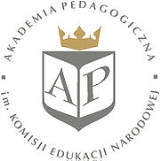
Pedagogical University of Cracow
Encyclopedia
Pedagogical University of Cracow (Polish: Uniwersytet Pedagogiczny im. Komisji Edukacji Narodowej w Krakowie, often shortened to Uniwersytet Pedagogiczny), located in Kraków
, Poland
, was founded on May 11, 1946, as the National Higher College of Teacher Training and since gained notoriety for training highly-qualified teaching staff for the local educational system.
In 1954 the college received the title of a Higher College. Curriculum increased to 4 years and students graduated with a Master's degree
. The Polish October
political transformations of 1956 resulted in the college gaining significant autonomy. For the first time the Rector was elected and not nominated. The first elected Rector was Prof. dr Wincenty Danek. Under his administration, the Higher College of Teacher Training rapidly developed and earned even more reputation. From the academic year 1958/1959 studies were extended to 5 years.
In 1959 the University received the right to offer doctorate degree programs and in 1967 the right to confer the degree of habilitated
doctor.
In 1989 a period of political and social transformations resulted in the Academy receiving complete independence and self-government. On October 1, 1999, the college was renamed to the Pedagogical Academy of Cracow of the National Education Commission (Akademia Pedagogiczna im. Komisji Edukacji Narodowej w Krakowie). On October 3, 2008, the college was renamed to the Pedagogical University of Cracow of the National Education Commission (Uniwersytet Pedagogiczny im. Komisji Edukacji Narodowej w Krakowie).
Kraków
Kraków also Krakow, or Cracow , is the second largest and one of the oldest cities in Poland. Situated on the Vistula River in the Lesser Poland region, the city dates back to the 7th century. Kraków has traditionally been one of the leading centres of Polish academic, cultural, and artistic life...
, Poland
Poland
Poland , officially the Republic of Poland , is a country in Central Europe bordered by Germany to the west; the Czech Republic and Slovakia to the south; Ukraine, Belarus and Lithuania to the east; and the Baltic Sea and Kaliningrad Oblast, a Russian exclave, to the north...
, was founded on May 11, 1946, as the National Higher College of Teacher Training and since gained notoriety for training highly-qualified teaching staff for the local educational system.
History
Initially, the Academy trained elementary school teachers; with the curriculum spanning over a period of 3 years. As early as in 1949, it began training secondary school teachers and was split into a new organizational structure based on departments. The academic posts were appointed, including those of the Senate, the Department Councils, the Rector, Vice-Rectors and the Deans.In 1954 the college received the title of a Higher College. Curriculum increased to 4 years and students graduated with a Master's degree
Master's degree
A master's is an academic degree granted to individuals who have undergone study demonstrating a mastery or high-order overview of a specific field of study or area of professional practice...
. The Polish October
Polish October
Polish October, also known as October 1956, Polish thaw, or Gomułka's thaw, marked a change in the Polish internal political scene in the second half of 1956...
political transformations of 1956 resulted in the college gaining significant autonomy. For the first time the Rector was elected and not nominated. The first elected Rector was Prof. dr Wincenty Danek. Under his administration, the Higher College of Teacher Training rapidly developed and earned even more reputation. From the academic year 1958/1959 studies were extended to 5 years.
In 1959 the University received the right to offer doctorate degree programs and in 1967 the right to confer the degree of habilitated
Habilitation
Habilitation is the highest academic qualification a scholar can achieve by his or her own pursuit in several European and Asian countries. Earned after obtaining a research doctorate, such as a PhD, habilitation requires the candidate to write a professorial thesis based on independent...
doctor.
In 1989 a period of political and social transformations resulted in the Academy receiving complete independence and self-government. On October 1, 1999, the college was renamed to the Pedagogical Academy of Cracow of the National Education Commission (Akademia Pedagogiczna im. Komisji Edukacji Narodowej w Krakowie). On October 3, 2008, the college was renamed to the Pedagogical University of Cracow of the National Education Commission (Uniwersytet Pedagogiczny im. Komisji Edukacji Narodowej w Krakowie).
Organizational structure
Faculties- Faculty of Humanities - about 9000 students
- Faculty of Pedagogy - about 6000 students
- Faculty of Geography and Biology - about 2000 students
- Faculty of Mathematics, Physics, and Technical Skills - about 3000 students
- Faculty of Art - about 300 students
Enrollment
For the academic year of 2006/2007 Pedagogical University had around 5800 placements available in the first year of full-time and external studies.- Faculty of Humanities - 2300 students
- Faculty of Pedagogy - 1380 students
- Faculty of Geography and Biology - 570 students
- Faculty of Mathematics, Physics, and Technical Science - 1550 students

